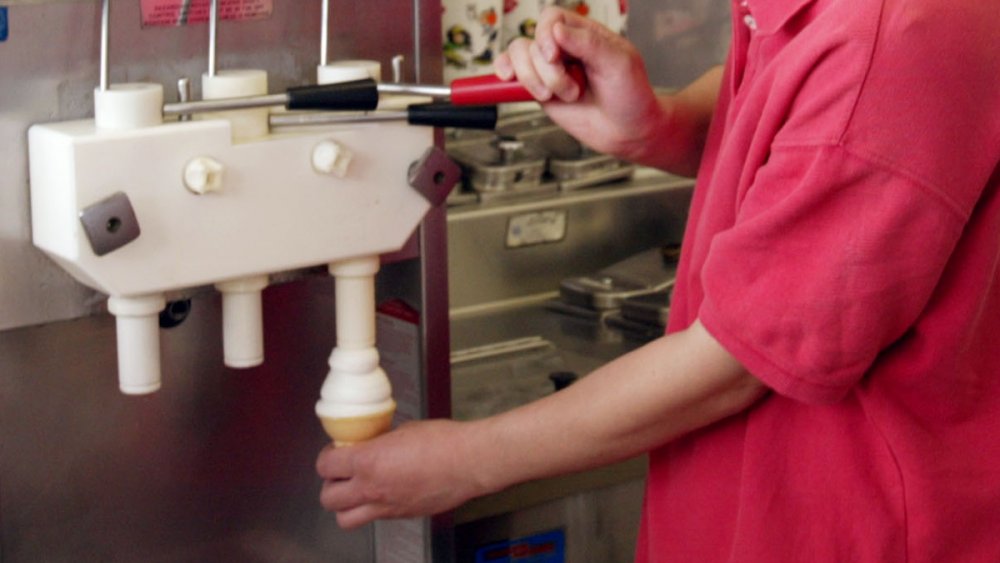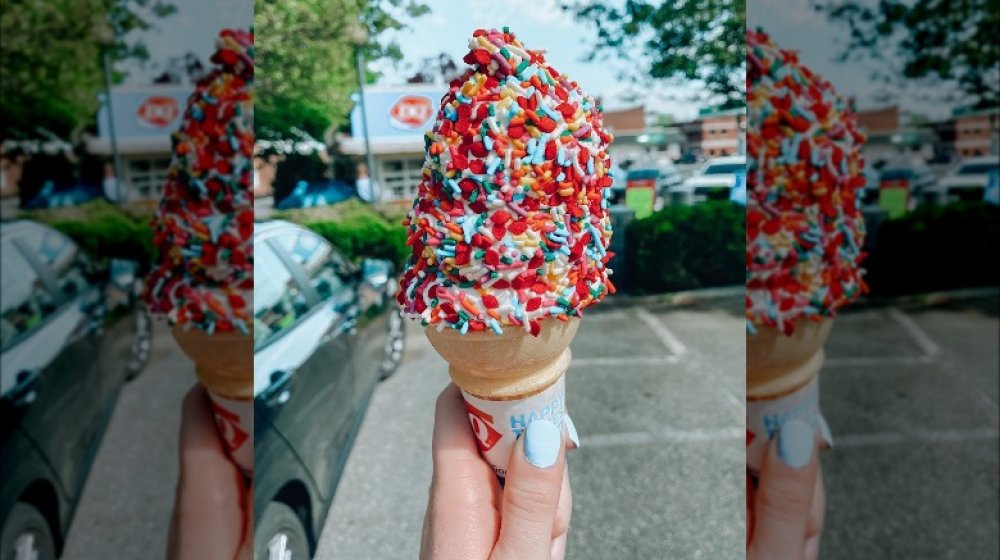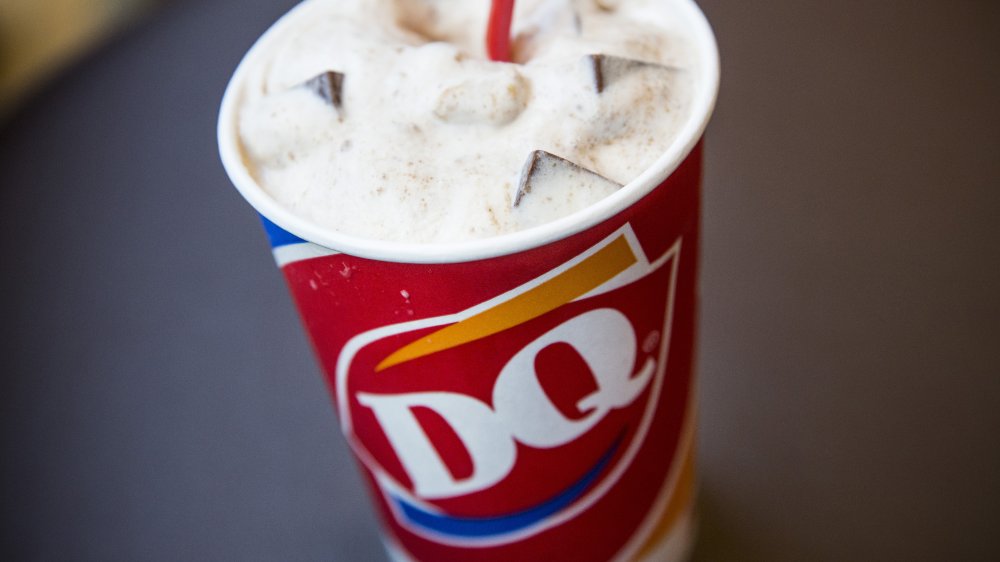This Is What Dairy Queen's 'Ice Cream' Is Really Made Of
In 2019, Dairy Queen moved its headquarters (via Minneapolis/St. Paul Business Journal). There, on two floors connected by a staircase with ice cream cone-painted walls, is the infrastructure necessary to perfect new flavors and products. In the office's newly designed test kitchens, QA, and product development labs, scientists work continually on quality assurance and menu development (via Greiner Construction and Edina Magazine).
We don't how Dairy Queen's soft serve is made. Presumably, along with its labs, Dairy Queen also moved the safe deposit box that holds the secret recipe to Dairy Queen's famous soft serve to Bloomington (via ABC News). We do, however, know what's in it.
Let's get one thing out of the way before we dive into the details. It's not actually ice cream. Yes, it's cold, creamy, sugary, and delicious. But according to the FDA, ice cream has to have at least 10 percent milk fat. Dairy Queen's soft serve has just 5 percent (via Eat This, Not That!). Why? According to Forbes, the 5 percent fat content makes the ice cream perfect for serving at its signature temperature, 18 degrees.
But Dairy Queen's soft serve recipe includes more surprising ingredients, still.
There's red seaweed in Dairy Queen's secret formula
It's worth noting that 40 percent of a Dairy Queen soft serve is air (via Wired). But that's not abnormal. According to the American Chemical Society, anywhere from 30 to 50 percent of any ice cream is. What's in the other 60 percent?
Dairy Queen's recipe, as listed on its website, is full of FDA-approved, but worrying ingredients. Take the mono and diglycerides, which ensure smooth texture (via Prospector). According to Science Direct, these can cause irritation in high concentrations and must be carefully controlled in food products. Then there's the guar gum that prevents ice crystal growth in soft serve (via Science Direct). When used in other manufacturing processes (think carpet manufacturing and pet food production), guar gum has been linked to asthma, abdominal pain, flatulence, diarrhea, and cramps.
Dairy Queen also lists Polysorbate 80 as an ingredient. Polysorbate 80, which binds ice cream together, has been linked to cancer and adverse reproductive effects in animals, although no human data has been found (via The Good Human). Finally, Dairy Queen's soft serve includes carrageenan, an FDA-approved carbohydrate derived from red seaweed (via HuffPost). Carrageenan gives your soft serve the thickness you crave. Unfortunately, similarly to Polysorbate 80, it's linked to inflammation, gut irritation, and cancer in animals (via Prevention).
Ice cream with a side of dirt
When you take a bite of your favorite version of Dairy Queen soft serve, you might be serving yourself an extra helping of dirt, sour milk, or cockroaches. Between 2015 to 2019, Dairy Queens across the country made local and national headlines for consistently violating health and safety violations.
In 2015, a Dairy Queen in Nogales, Arizona was shut down when local health authorities found cockroaches in the kitchen and expired milk being used for milkshakes (via Nogales International). In 2016, inspectors shut down a Dairy Queen in Tampa, Florida after finding cockroaches in the soft-serve ice cream machine and under the Blizzard machine (via ABC News). In 2018, health inspectors found 12 violations at a Dairy Queen in Shreveport, Louisiana, including lack of a food safety certificate (via KSLA News). Ultimately, NBC News took its Dateline cameras undercover and found 184 "critical violations" across 100 Dairy Queens nationwide (visa NBC News). In 2019, health inspectors in Richmond, Virginia found dead flies on a prep table and pink and black mold in the ice machine at a local Dairy Queen (via NBC News). In Cape Coral, Florida, inspectors closed a local Dairy Queen for three days after finding... can you guess what? Roaches (via News-Press).
Suffice to say, if you're planning a trip to Dairy Queen any time soon, maybe check that their food safety certificate is up to date.
Dairy Queen's 'ice creams' have up to 75 percent of your recommended daily calories
Besides an extra helping of dirt, if you indulge in a trip to Dairy Queen, you may be in for more empty calories than you're bargaining for. Yes, a vanilla kids cone has a manageable 170 calories, but be let's be real (via Very Will Fit). Who goes to Dairy Queen for a kiddie Cone?
The hard truth is that your favorite Dairy Queen options may not be so friendly on anyone following a 2,000 calorie daily diet. A Dreamsicle Dipped Cone? That will be 650 calories. A large Peanut Butter Sundae? That's 780 down the drain. Dairy Queen's new, Tiramisu Cake Shake? Dairy Queen discloses that its large version of this dreamy treat has 810 calories. Or perhaps you're dying to try the Frosted Animal Cookie Blizzard? A large will cost you 1,310 calories (via Dairy Queen). But the Royal Reese Brownie Blizzard? We hate to break it to you, but according to Dairy Queen, that'll be a whopping 1,490 calories. Consider that 1,490 calories are 75 percent of your recommended intake on a 2,000 calorie diet.



